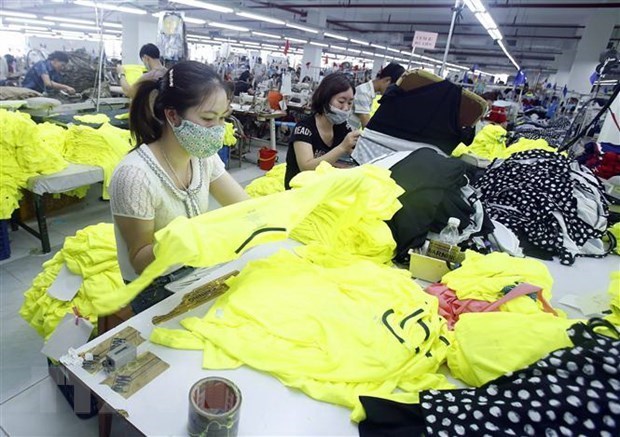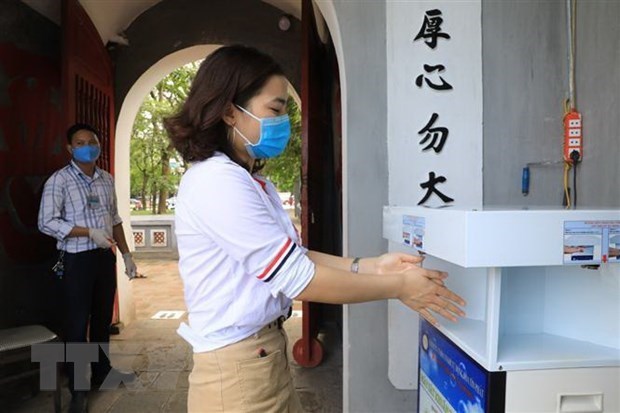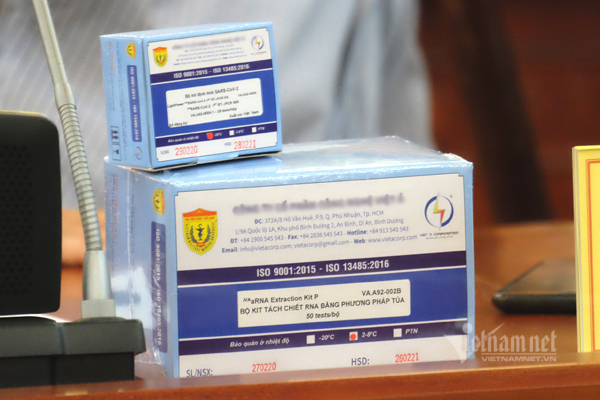 |
|
The real-time RT-PCR bio-kits jointly made by the Military Medical Academy and Viet A Technology Joint Stock Company
|
Vietnam has exported 20,000 Covid-19 test kits to eight countries so far.
The real-time RT-PCR bio-kits jointly made by the Military Medical Academy and Viet A Technology Joint Stock Company have been licensed by the Ministry of Health for mass production.
According to Phan Quoc Viet, general director of Viet A Technology Joint Stock Company, the countries include Laos, Cambodia, Indonesia, Ukraine, Poland, Hungary and Austria.
Viet added that Vietnam is negotiating with around 20 other nations for the export of this product.
Each kit consists of 50 tests with each test being used for one person while the duration should last for a total of two hours. Each test using the real-time RT-PCR bio-kits costs VND400,000-600,000 (USD17.39-USD26.08).
A Vietnamese firm has also ordered the test kits for the sole distribution in the international market with roughly one million test kits per month.
Viet noted that his company could ensure the supply of three million test kits monthly.
The real-time RT-PCR bio-kits have been presented with the CE marking and Certificate of Free Sale (CFS), allowing the test kits to be sold in the European Economic Area, including the UK.
The producers are completing procedures to apply for the certificate of the US’s Food and Drug Administration (FDA) certificate. This standard is hoped to be granted in the next two weeks.
More Covid-19-hit Vietnamese nationals abroad to be repatriated
More flights to bring Vietnamese nationals affected by the Covid-19 pandemic in different countries home will be organised.
According to the Civil Aviation Administration of Vietnam (CAAV), 21 flights will help in repatriation efforts between May 18 and June 15.
National flag carrier Vietnam Airlines will operate 14 flights to transport Vietnamese nationals from Thailand, India, the Netherlands, South Korea, Singapore, the UK, Australia, New Zealand, Japan, Finland, Sweden, Canada, Angola and the US.
Meanwhile, budget carrier Vietjet Air will provide five from Myanmar, Taiwan, South Korea, Singapore and Japan.
The two remaining flights from Singapore and Kuwait will be carried out by Bamboo Airways.
Wide-body planes such as Boeing 787-9, Boeing 787-10 and Airbus 350 will be used for the flights.
All of the passengers have to pay for the air tickets.
Earlier, 13 flights were run for the return of Vietnamese people from different countries, including Japan, the US, Canada, France and Spain from mid-April to May 17. Most of the flights were operated by Vietnam Airlines.
The flights landed at Noi Bai International Airport in Hanoi, Van Don International Airport in Quang Ninh Province, Can Tho International Airport in Can Tho City, or Tan Son Nhat International Airport in HCM City. The passengers were directly sent to quarantine zones for Covid-19 prevention.
Brookings Institute: Improved governance helps Vietnam weather COVID-19
|
|
The US-based Brookings Institute on May 20 ran an article attributing Vietnam’s success in COVID-19 containment to its improved governance and policy coordination.
Vietnam is now one of the first countries to ease social distancing measures and reopen its society, it said.
According to the article, Vietnam’s state capacity was not born overnight but resulted from decades-long efforts to improve governance and responsiveness at local levels.
Data from Vietnam’s Provincial Competitiveness Index (PCI) and Provincial Administrative Performance Index (PAPI) showed that the Vietnamese provinces have made steady improvements in healthcare, information access, and corruption control. Access to health insurance has grown rapidly over time, with 90 percent of Vietnamese citizens insured today.
Taken together with the government’s policy to provide mass quarantine largely free of charge, these data suggest that the Vietnamese citizens today did not have to worry about costs from COVID-19 tests, associated hospitalisation, and centralised quarantine, thereby increasing their willingness to comply with extensive contact tracing and strict quarantine measures.
Vietnam’s ongoing anti-graft campaign has generally received favourable responses from watchers and international audiences, it said, adding that the anti-graft campaign has also intersected with the pandemic response. The head of the Hanoi’s Centre for Disease Control has recently been indicted on a charge of collusion to inflate COVID-19 test kit costs.
The institute stressed that transparency efforts have also mitigated skepticism towards the Vietnamese Party and State’s COVID-19 reporting. The Ministry of Health has posted all reported cases online, enabling deeper analysis by data scientists and bloggers, and gaining endorsement from public health experts.
Commenting on Vietnam’s post-pandemic growth, the article said the current strategy focuses on promoting the domestic market and repositioning Vietnam for opportunities in shifting global supply chains.
To promote Vietnam’s domestic market, it said the Vietnamese leaders have issued a host of relief measures, including freezing business obligations to pay costs such as retirement and life insurance contributions, providing quick-access loans for wage payments, and increasing social welfare for laid-off workers.
Vietnam’s leaders have put forth a plan to promote linkage in the domestic market, including in tourism, agriculture, and seafood. Among other actions, this requires reorienting businesses towards high-demand areas.
While eager to restart its economy, the country also made clear that economic revitalisation must be balanced with public health goals by imposing limited hours for businesses, crowd control, and continued enforcement of social distancing requirements. Compliance with these measures hinges on continued public trust.
The article concluded that Vietnam’s improving governance and central-local policy coordination have helped it weather the COVID-19 pandemic, enabling the reopening of its society and economy ahead of most peers.
Despite the clear challenges Vietnam faces, the country’s strong growth trajectory and swift COVID-19 response have positioned it to be one the world’s few economic bright spots. The World Bank projected that Vietnam will be one of few countries to experience positive economic growth in 2020, and it managed to attract 8.6 billion USD in foreign investment during the first quarter of 2020. This success, however, depends upon continuing the historical trajectory of improved economic governance, including reducing corruption./.
Four people connected to COVID-19 patient 275 test negative
Four people connected to COVID-19 patient 275 tested negative for SARS-CoV-2, said Bùi Quốc Nam, director of the Bạc Liêu Department of Health and also deputy head of the provincial steering committee for COVID-19 prevention and control.
Earlier, the Bạc Liêu General Hospital discovered a vendor who was in contact with patient 275, who is undergoing treatment at the provincial general hospital.
At 5.30pm on May 16, the vendor Trần Khánh Vui, who works as a vendor in the hospital, went through its quarantine centre. Patient 275, 33, from Hải Dương Province, asked Vui to help him buy cigarettes and water.
The centre’s security camera showed that the two were in contact several times, about five minutes each time and both of them wore face masks.
When the case was discovered, the provincial steering committee on May 19 brought Vui, his wife and a child, and a man who had drunk with Vui to a quarantine centre and sent their samples to the HCM City Pasteur Institute for tests.
Nam said that with the test results, Vui’s home in Huế Village, Ward 2 in Bạc Liêu City would not be quarantined. Students of the Kim Đồng Primary School in Ward 3, Bạc Liêu City, where Vui’s child studied, would not have to be absent from school.
After the case, the provincial steering committee will improve security work, set up more fences and install more cameras around the quarantine centre.
US Centres for Disease Control and Prevention Commits $3.9m for COVID-19 in Việt Nam
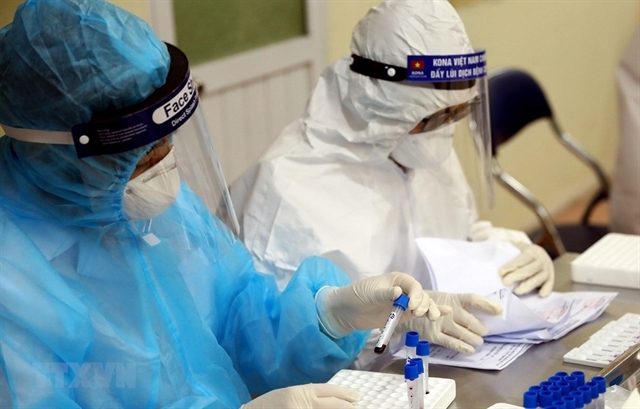 |
| Health workers take blood samples for COVID-19 testing in Hà Nội. |
The US Centres for Disease Control and Prevention (US CDC) has committed an initial US$3.9 million for its COVID-19 activities in Việt Nam to support prevention, preparedness, and response, including some regional activities, the US Embassy in Hà Nội announced on Wednesday.
These initial resources are being used for laboratory testing, field investigations, surveillance, data analysis, and infection prevention and control.
Since January, US CDC has been supporting Việt Nam to prepare for and respond to the COVID-19 pandemic.
The US CDC provided direct technical assistance on emergency operations, specimen transport, laboratory testing, disease surveillance, infection prevention and control (IPC), and risk communication.
They also worked alongside Vietnam's Ministry of Health, training field epidemiologists (disease detectives) to conduct outbreak investigations to collect, analyse and interpret data and contribute to evidence-based decisions.
US CDC conducted training on IPC, contact tracing, and laboratory testing and quality assurance.
The US CDC also helped Việt Nam develop its national guidelines and protocols, together with the Ministry of Health in the areas of infection control, health facility readiness and preparedness, surveillance, laboratory testing, and maintaining HIV treatment during COVID-19.
Health co-operation between the US and Việt Nam has been the cornerstone of the bilateral engagement since 1998 when the US CDC partnered with Việt Nam to establish high-quality, sustainable health systems, strengthen long-term public health capacity and protect the health of Vietnamese and Americans.
Building on this partnership with US CDC, Việt Nam is currently at the forefront of global efforts to prevent, detect, and respond to COVID-19.
US CDC has been working with Việt Nam to strengthen capabilities in four essential areas including surveillance systems to quickly catch outbreaks before they spread, laboratory networks to accurately diagnose disease and identify new pathogens.
Another co-operation area is to enhance the capacity of frontline health staff to identify, track, and contain outbreaks at their source.
US CDC also support Việt Nam in strengthening capacity of Emergency Operations Centres to co-ordinate effective response efforts when crises occur.
The goal of US CDC’s global health response to COVID-19 is to limit human-to-human transmission and minimise the global impact of COVID-19 through collaboration with key country and non-governmental partners to mitigate vulnerabilities and gaps in preparedness.
$300 million was authorised for US CDC’s global response to COVID-19 as appropriated by Congress in the Coronavirus Preparedness and Response Supplemental Appropriations Act.
This funding builds on US CDC’s long-standing global investments to control HIV, TB, and malaria, eradicate polio, and prepare for influenza and other pandemic diseases.
Safe shelter amid coronavirus war
As many countries around the world have struggled to stave off COVID-19, Vietnam has done a sterling job in prevention and control. Not only local people but also foreigners remain safe and sound in the country.
Vietnam has recorded zero community-transmitted cases for 35 days straight.
266 patients have been given the all-clear as at May 21.
The Vietnamese Government eased its social distancing order following positive results.
A return to normalcy has already been seen among local people and foreigners./.
HCM City gives financial aid to household businesses affected by COVID-19
The HCM City People’s Committee has approved additional financial assistance of VNĐ830 billion (US$35.5 million) to support household businesses and workers affected by the COVID-19 pandemic.
The money will be sourced from the city's State budget. Household businesses and workers in 23 districts will be the beneficiaries.
About VNĐ819 billion will be allocated to help 273,000 workers who have lost their jobs due to the crisis.
Nearly 3,730 household businesses with annual turnover of less than VNĐ100 million ($4,300) that have suspended operations will receive total support of VNĐ11 billion.
District 1 will provide more than VNĐ33 billion ($1.4 trillion) from its budget reserve to 11,000 workers and 80 household businesses in need of support.
In late April, the city provided VNĐ638 billion ($27.4 million) to support those affected by the pandemic. The city allocated VNĐ1.8 trillion ($77.4 million) to provide allowances to 600,000 affected people, including workers in industrial parks, export processing zones and Sài Gòn Hi-tech Park, as well as teachers at private kindergartens.
The allowances will be given for no more than three months, which had been started from April.
A recent survey showed that about 75 per cent of businesses in the city had been forced to reduce production due to a lack of raw materials or a decline in exports due to the impact of the COVID-19 pandemic.
As a result, many of them had to temporarily lay off staff or reduce the number of staff by 25-30 per cent.
All severe COVID-19 cases now clear of virus: Health Ministry official
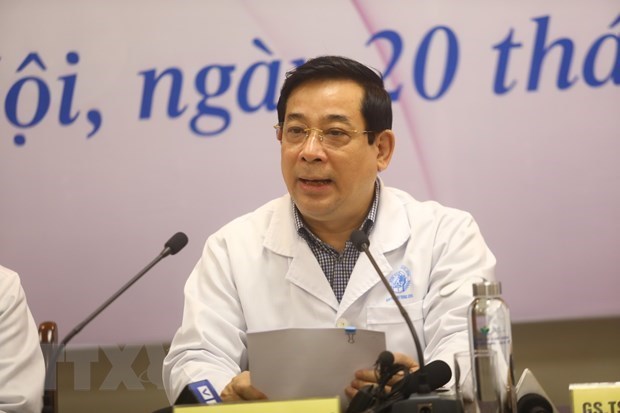 |
| Director of the Health Ministry’s Department for Management of Medical Examination and Treatment Luong Ngoc Khue |
The three most severe cases of COVID-19 in Vietnam have all become clear of SARS-CoV-2, the virus that causes COVID-19, a health official said on May 21, and there have been no COVID-19-related deaths in the country.
Director of the Health Ministry’s Department for Management of Medical Examination and Treatment Luong Ngoc Khue said the most severe case, Patient 91 - a British pilot with a Vietnamese airline being treated at the Hospital for Tropical Diseases in HCM City - has tested negative for SARS-CoV-2 six consecutive times.
The patient has been transferred to the city’s Cho Ray Hospital for the treatment of other ailments, Khue said.
He added that during just one week, 59 people registered lung donations to Patient 91, with the youngest volunteer being 21 years old and the oldest 76.
Appreciating their intentions, the official noted that the patient needs two whole lungs, not just one or part of a lung, so donations from brain-dead donors are the top priority.
Medical experts are also considering transferring the patient to the UK, since he is now free of COVID-19.
However, Khue said, the man remains in a coma and is on extracorporeal membrane oxygenation (ECMO) - a life support machine - so he must regain consciousness before a suitable plan of action is determined.
Patient 91 was treated for COVID-19 for two months and three days, including 46 days on ECMO, and his lungs were condensed by 90 percent.
A second CT scan shows that about 20-30 percent of his lungs have recovered and their function have also improved considerably. His pulse and blood pressure are also stable, according to Khue.
Another severe case is Patient 161, 88 years old, who has also now recovered from COVID-19 after receiving treatment at Hanoi’s National Hospital for Tropical Diseases. She has also been discharged from Bach Mai Hospital after being sent there for treatment of a stroke.
Meanwhile, Patient 19, who also suffered three cardiac arrests, is recovering and will leave hospital shortly, the official said.
On the afternoon of May 21, two patients at the National Hospital for Tropical Diseases were declared to be clear of COVID-19 but will continue to be quarantined for another 14 days.
So far, 266 of the 324 COVID-19 patients in Vietnam have recovered from the disease.
Travellers allowed to transit through Singapore’s Changi Airport from June 2
Singapore will gradually allow travellers to transit through its Changi Airport from June 2, as the country is preparing to ease some COVID-19 restrictions and reopen its borders, announced the Civil Aviation Authority of Singapore (CAAS) on May 20.
Currently, foreign passengers are only allowed to transit through Singapore if they are on repatriation flights arranged by their governments.
The CAAS said that airlines should submit their proposals for transfer lanes through Changi Airport, adding that the proposals will be evaluated taking into account aviation safety, public health considerations, as well as the health of passengers and air crew.
Stringent measures will be put in place to ensure that the passengers remain in designated facilities in the transit area and do not mix with others at the airport.
Existing precautionary measures, such as safe distancing and temperature taking for passengers and staff, will continue to be enforced, said the authority.
Airport staff will also be required to wear personal protective equipment when interacting with passengers.
Singapore has closed its borders to all short-term travellers since March 23, even to those transit through the country, as the government took control measures to prevent imported COVID-19 cases.
This has dealt a blow to the country’s aviation and tourism sectors. Changi Airport saw a 99.5 percent decline in passenger movements in April compared to last year’s 5.58 million passengers per month./.
Nearly 240 Vietnamese brought home from Myanmar
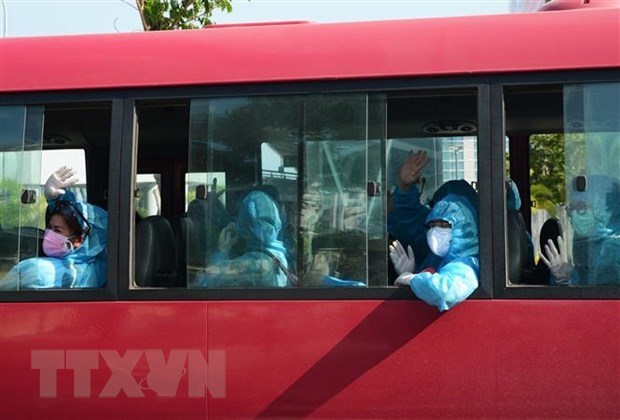 |
|
|
Nearly 240 Vietnamese citizens in Myanmar were brought home safely on a flight of budget carrier Vietjet Air on May 21, arranged by Vietnamese agencies, the Vietnamese Embassy in Myanmar in coordination with Myanmar agencies.
The repatriated citizens are those in particularly disadvantaged circumstances who wished to return to Vietnam. They include children aged under 18, the elderly, the ill, pregnant women, stranded travelers, workers with expired visas and labour contracts, and students having completed study.
All underwent heath check-ups and were put into concentrated quarantine after landing at Da Nang International Airport.
The carrier also ferried some Myanmar citizens back to their homeland on the outbound leg.
Depending on the quarantine capacity at localities and the overall situation regarding COVID-19, more commercial flights bringing Vietnamese citizens home will be arranged in the future, in accordance with the Prime Minister’s directions./.
YouGov: Vietnam has highest trust in COVID-19 media coverage
|
|
Vietnam has the highest trust in COVID-19 media coverage, with 89 percent of respondents expressing their belief in a poll recently conducted by the UK’s data analysis and market research firm YouGov.
It is followed by India with 67 percent and China 62 percent.
In Germany, 54 percent of people trust their media's coronavirus coverage, while the rate is 50 percent in Spain, 42 percent in the US and 38 percent in Italy.
The UK's media landscape has been bitterly fragmented and divided by Brexit and it is hardly a surprise that faith in its coronavirus coverage is one of the lowest in the dataset at just 31 percent. Behind the UK is France with only 26 percent./.
Singapore uses doglike robot to supervise social distancing observance
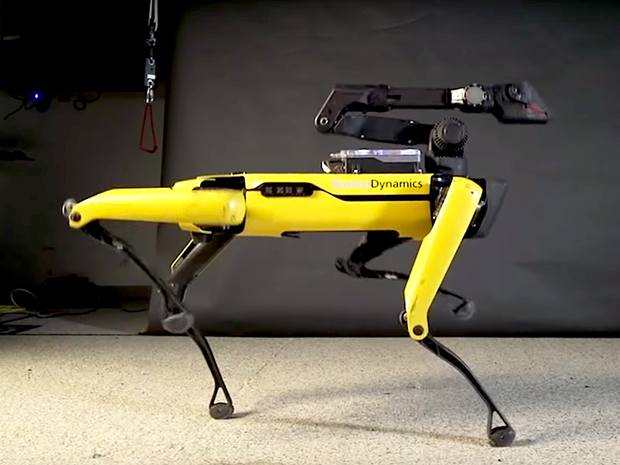 |
|
Boston Dynamics’ robot dog. Boston Dynamics/YouTube
|
A yellow robot dog called Spot which found fame online for dancing to hit song "Uptown Funk" has been deployed to patrol a Singapore park to supervise people’s observance of social distancing rules.
The hi-tech hound is remote-controlled and can clamber easily over all types of terrain, which means it can go where wheeled robots cannot.
Spot uses cameras to estimate the number of visitors to the park and blasts out a message to ensure joggers and walkers keep their distance to limit the spread of the coronavirus: "For your own safety and for those around you, please stand at least one metre apart. Thank you."
Spot, which is being trialled over a three-kilometre (1.8 mile) stretch of the park, also has sensors to ensure it does not bump into people.
Developed by US company Boston Dynamics, Spot is best known for a video where the robot showed off its moves by bopping to Mark Ronson hit "Uptown Funk". The video has been viewed over 6.8 million times on YouTube.
The use of the robot has been widely welcomed. Some others had misgivings, however.
Singapore authorities have played down privacy concerns, saying Spot's cameras cannot track or recognise specific individuals and no personal data will be collected.
The city-state has reported over 29,000 virus cases, mostly among migrant workers living in dormitories, and 22 deaths./.
No new community COVID-19 infections reported for 36 days
|
||
|
Taking samples for SARS-CoV-2 testing |
Vietnam confirmed no new COVID-19 cases from May 21 afternoon to May 22 morning, marking the 36th consecutive day without community transmission.
According to the National Steering Committee for COVID-19 Prevention and Control, the total infections in the country stands at 324, including 184 imported cases which were quarantined upon their arrival.
As many as 266 out of 324 patients have recovered as updated on May 22 morning, accounting for 82 percent of the total.
The 58 remainders are being treated at nine national and provincial medial facilities, with four testing negative once for SARS-CoV-2, the novel coronavirus that causes the acute respiratory disease, and four negative at least twice.
A total of 14,744 people who had close contact with COVID-19 patients or returned from pandemic-hit areas are under health monitoring, of whom 266 were quarantined at hospitals, 7,726 at other concentrated facilities and 6,752 at home.
Deputy Prime Minister Vu Duc Dam, who is head of the National Steering Committee for COVID-19 Prevention and Control, has warned of the increased risk of infection in the near future, requiring the entire disease prevention system to not let guard down./.
Vigilance against COVID-19 still needed
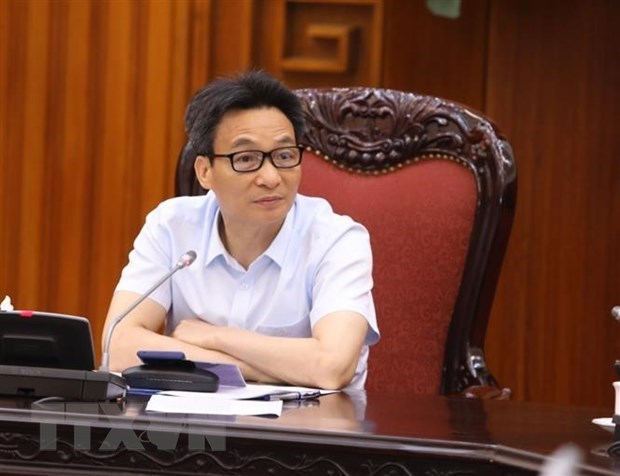 |
|
Deputy PM Vu Duc Dam
|
Vietnam has contained well the COVID-19 pandemic but yet to win over it, Deputy Prime Minister Vu Duc Dam, head of the National Steering Committee for COVID-19 Prevention and Control, said at a meeting of the committee in Hanoi on May 21.
Along with the world, the fight against the pandemic may last long, and Vietnam must be always in the readiness status, the Deputy PM stressed.
Deputy Minister of Health Nguyen Thanh Long said more than 5 million COVID-19 cases, including 325,000 deaths, have been recorded in 215 countries and territories nationwide.
In Southeast Asia, there are 72,600 cases and nearly 2,300 fatalities. Vietnam, Cambodia, Laos and Timor-Leste have so far reported no deaths caused by the acute respiratory disease.
Vietnam has gone 35 straight days without community infections and the national count remains at 324, Long told the meeting.
The British man, designated as Patient 91 who is being treated at the HCM City Hospital for Tropical Diseases, has tested negative for SARS-CoV-2, the novel coronavirus that causes the disease, for six times, and his lung function has improved as compared with the previous days.
Regarding Flight VN001 from the US to Hanoi on May 16, Long said the test results of all 25 crew members came out negative.
All of the 299 passengers returning from Thailand on May 18 have also been put under quarantine at concentrated facilities and their test results were negative, the official added.
Although no community infections have been recorded over the past 35 days, competent forces have still maintained their active response and vigilance against the epidemic, Long said.
Committee members shared the views on the risk of transmission from Vietnamese returning from abroad, foreign experts and labourers, diplomatic and official passport holders, crew members and residents travelling through borders.
They, therefore, urged the Ministry of Transport and localities to continue tightening control over passengers entering Vietnam, and seriously observe quarantine regulations.
Local authorities and the public security sector have to guide the grant of visas for foreigners and prepare quarantine facilities, they said./.
APEC senior officials to hold virtual meeting on post-COVID-19 economic recovery
Malaysia will chair a virtual senior officials' meeting of Asia-Pacific Economic Cooperation (APEC) economies, its Ministry of International Trade and Industry said on May 21.
The meeting, scheduled on May 27, will focus on operationalisation of the APEC Ministers Responsible for Trade statement on COVID-19 and will discuss issues related to economic recovery, while ensuring that the efforts already in place to mitigate the health impact of the outbreak continue to yield positive results.
Earlier this month, the APEC Ministers Responsible for Trade issued a statement calling for greater cooperation among participating economies to facilitate trade as a way to combat the COVID-19 outbreak.
Apart from public sector representatives from APEC economies, the meeting will also witness the participation of private sector players through the APEC Business Advisory Council (ABAC)./.
Indonesia reports 973 new COVID-19 cases, biggest daily jump
 |
| In Jakarta, Indonesia (Photo: Xinhua) |
The Indonesian Health Ministry announced 973 new confirmed cases of COVID-19 on May 21, the biggest daily jump so far.
Of the new cases, 502 were located in East Java, which even surpassed that of Jakarta.
Meanwhile, Thailand’s Security agencies have agreed on the need to extend use of the emergency decree for another month, until the end of June, on concerns about the COVID-19 situation.
National Security Council Secretary-General Gen Somsak Rungsita said a meeting of the committee on easing COVID-19 restrictions, which he chaired, agreed on the extension to June 30, as the global situation was still worrying.
Although Thailand had successfully controlled the spread of the coronavirus, extra caution is needed to prevent a possible a second wave of COVID-19 infections following the easing of the nationwide lockdown.
If a second outbreak occurs, the damage will be more severe, Gen Somsak said.
The resolution would be forwarded to the Centre for Covid-19 Situation Administration. If the CCSA agreed, it would be submmitted to the cabinet next week for a decision, Gen Somsak said.
Domestic travel is now permitted in Laos for all people throughout the country, but prevention measures and guidelines must be strictly followed.
The measures include arranging suitable seating for passengers with social distancing of at least one meter and everyone must have their body temperature checked.
Businesses managers must provide soap and hand sanitiser for customers.
Laos has conducted testing on 4,812 suspected cases, with 19 positive. Fourteen patients have recovered./.
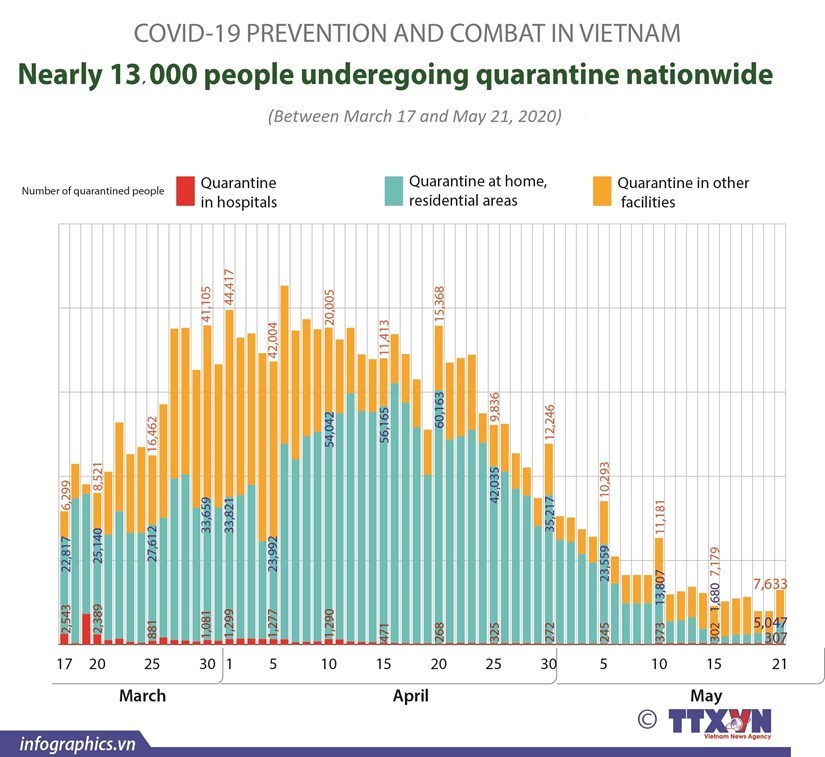 |
|
|
VietNamNet/VNA/Dtinews/VNS/VOV
